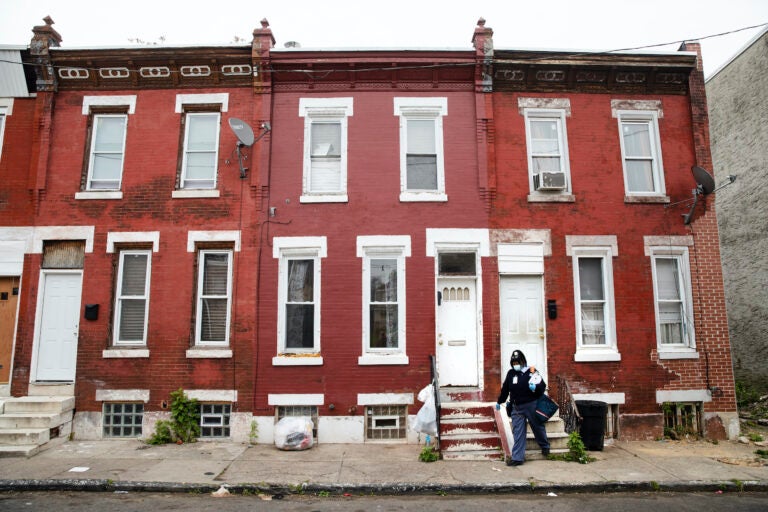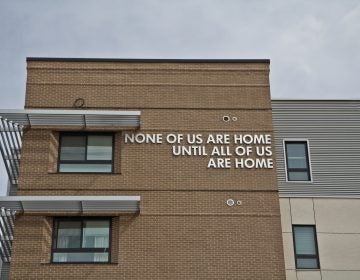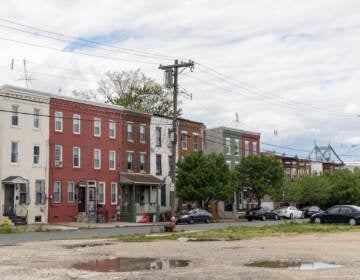I was a Philly judge in 2008. We need to act now to stop the next economic crisis
When the 2008 financial meltdown happened, we knew we had to move fast. Now, another economic disaster looms and Philly has a chance to lessen its impact.

USPS carrier Henrietta Dixon walks her route to deliver mail in Philadelphia, Wednesday, May 6, 2020. (AP Photo/Matt Rourke)
When the 2008 financial meltdown happened, we knew we had to act fast.
In the aftermath of the crisis, Philadelphia saw a 200% increase in foreclosure filings. Calling upon local court leadership and a group of stakeholders from the housing community, our local court created a new mortgage foreclosure diversion program in just seven weeks. The very simple purpose of the program was to place homeowners and their legal aid advocates face-to-face with lenders to work out a resolution to the foreclosures and save their homes.
It worked. The program saved Philadelphia from taking a huge economic hit. More than 16,000 homes have been saved — and the numbers continue to grow as the program continues. When people are able to keep their homes, it saves money in the costs of social services, medical care, and other preventable expenses.
It might feel like we are now reaching an uncharted course, figuring out how to navigate a post-coronavirus landscape, with anticipated tsunami flight to the courts for distressed citizens, particularly in the area of rental housing. The anticipated economic consequences would be immediate and lasting for tenants and landlords.
There is already a backlog of 1,700 eviction court hearings that will need to be rescheduled when the court reopens, in addition to the ongoing monthly average of 1,500 eviction hearings. There were hundreds of judgments entered in the 60 days before the court closed and lockouts will proceed once the court opens back up.
But this time we know what could work. This is not truly an uncharted course; we have done it before. We now know that extraordinary times beget extraordinary opportunities, but we must take extraordinary measures.
A report that was just released by the Reinvestment Fund recommends piloting an eviction diversion program modeled on Philadelphia’s mortgage foreclosure diversion program. The report is based on detailed data which shows the need for exploring options to improve the delivery of legal services and ease the burden on the courts. Just as in 2008, these challenging times mandate novel ways of preventing evictions to stabilize housing of our citizens to sustain communities and neighborhoods throughout the city. A collaboration of stakeholders in the housing arena, in partnership with court leadership, the Kenney administration and City Council, is exactly the sort of extraordinary measure needed.
A “pilot” eviction diversion program would allow landlords and tenants, and their respective advocates, to work out agreements before going through a lengthy and costly court process. Renters would be connected with legal aid lawyers, where needed, and could also access invaluable housing counselors and related resources to keep them in their homes. With early resolution of disputes, certainty follows, allowing landlords to get paid so they don’t have to go through the expense of turning over a unit. The Philly Tenant Hotline, which is already run through the Philadelphia Eviction Prevention Project, would serve as a centralized way to get tenants the help they need, just as the Save Your Home Philly hotline does for homeowners.
Uniquely, this proposal has the backing of a variety of credible sources.
In the recently released “Plan to Reopen the Philadelphia Municipal Court’s Civil Division to the Public in a Safe Manner during the Covid-19 Pandemic,” the court recognized the importance of an eviction diversion program, stating that “the court is prepared to accommodate such a program,” as long as it is appropriately funded.
The Philadelphia Bar Association has also endorsed it with a resolution.
Legislation to create this program was introduced by Councilmembers Helen Gym, Kendra Brooks, and Jamie Gauthier. We encourage swift passage of this legislation, which is being voted on, on Friday, June 5th. With so many people and organizations united on this front, we can’t miss the opportunity to pilot this program.

Subscribe to PlanPhilly
In recent years, more attention has been paid to the sanctity of homes for renters. With the creation of the Philadelphia Eviction Prevention Project in 2017, and the passage of Right to Counsel legislation, City Council and the Mayor sent a message that homelessness prevention for renters is key.
If anything, the events of the past week show the importance of housing stability for neighborhoods and communities where our most vulnerable citizens are most adversely impacted.
Now, in this crisis, we must take action.
We were there in 2008. Philadelphia has a track record of successfully navigating its way out of a recession. But success can only come when we begin thinking of old things in new ways. All partners, from City Council and the Mayor, to landlords and tenants, to the courts and the legal aid organizations that helped navigate us out of the last crisis must come together and try a novel approach.
Philadelphia tenants have lost their jobs, their incomes, and have no idea how they will pay their rent. We are headed for a financial crisis, but the City already has the tools and the playbook to step up and help Philadelphia navigate through this storm. As countless Philadelphians face the threat of homelessness, the courts, with funding from the city and anticipated state money for rent relief, we can’t miss the opportunity to pilot an eviction diversion program to keep people in their homes.
Hon. Annette M. Rizzo (Ret.) served as a Judge for 16 years in the First Judicial District, Commonwealth of Pennsylvania. In 2008, Judge Rizzo developed the Court’s Residential Mortgage Foreclosure Diversion Program. She currently works at JAMS ADR.
WHYY is your source for fact-based, in-depth journalism and information. As a nonprofit organization, we rely on financial support from readers like you. Please give today.








